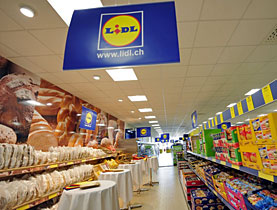
Lidl touchdown to have “more impact” than Aldi

The arrival of German discount supermarket chain Lidl in Switzerland on Thursday is expected to create more waves than its rival Aldi in 2005.
Notoriously high Swiss grocery prices have already fallen in the past four years. But new competition between Aldi and the more “Swiss-friendly” Lidl could drive them further down, one retail expert believes.
Hard discount chain Lidl will open its first 13 stores in Switzerland on Thursday and the German giant is expected to expand swiftly.
Thomas Rudolph, a professor of marketing at St Gallen University, said tests have already shown than most Swiss consumers prefer the range of well-known brand names stocked by Lidl to Aldi products.
“Lidl could have a greater impact with Swiss consumers in the first six months of opening than Aldi achieved.
“At the beginning it could be easier for Lidl, but they will only achieve store loyalty if their promises about quality come true,” Rudolph told swissinfo.
Established chain “unafraid”
Swiss rivals, led by the Coop and Migros chains, reacted to the entrance of Aldi by introducing new low price ranges to their shelves.
Rudolph believes that if the two German discounters compete fiercely on prices, then the Swiss consumer would see beneficial results. “It is possible that the price of goods could come down by as much as 10% in next three years if price competition increases and the cost of raw materials does not rise,” he said.
Migros and Coop, which account for about 70 per cent of the market share for food and drinks in Switzerland, both reported impressive financial results last year. Migros was remaining tight-lipped about the intensifying competition but Coop spokesman Karl Weisskopf said the chain was “not afraid” of the new arrival.
“We have already seen with Aldi that we could nevertheless strengthen our position in the market,” he told swissinfo. “We are near to the people with 1,000 shops where our customers can buy low budget, fine food and organic products. That’s different from Lidl.”
Rudolph believes the established Swiss giants will have to reach out yet further to their customers, market their strengths better and continue the strategy of offering more innovative products, such as mobile telephones. If not, he believes they could lose five per cent market share in the next five years.
Recession to help discounters
Discount stores are more likely to benefit from the growing recession as more customers opt to save money when buying groceries.
And the current economic difficulties could force the pace on a number of initiatives that would liberalise the Swiss market by bringing down restrictions on importing cheaper goods to sell in Switzerland.
“The recession could help to speed up the process of lifting trade barriers. Perhaps it will only take five or six years rather than ten for the Swiss market to open up. This would help Lidl to bring in their market power from Germany,” said Rudolph.
Should this happen, Rudolph believes big suppliers such as Nestlé would be the first to feel the squeeze ahead of Swiss farmers, who would still enjoy some protection.
swissinfo, Matthew Allen
German discount chain Lidl has entered an already fiercely competitive Swiss groceries market, with rival Aldi competing with market leaders Coop and Migros and Swiss discounter Denner (owned by Migros).
The firm has remained tight-lipped about its future plans, but it is expected to double its 13 stores within a year and is reported to have planning permission for a total of 62 – mainly in the German-speaking part of Switzerland.
Migros and Coop have between them around a third of the retail market share, which rises to 70% in the food and drinks sector.
Aldi touched down in Switzerland in October 2005 and had some 80 Swiss stores by the end of 2008 – a market share of roughly 1%.
By the end of 2010 both Aldi and Lidl chains are expected to operate 220 stores, seizing 5% market share, according to research by Credit Suisse bank.
The arrival of German rivals also sparked a consolidation of the supermarket retail sector in Switzerland. In 2007, Migros got the green light to take over Denner while Coop targeted the stores left behind by the departing Carrefour and electronics chain Fust.

In compliance with the JTI standards
More: SWI swissinfo.ch certified by the Journalism Trust Initiative






























You can find an overview of ongoing debates with our journalists here . Please join us!
If you want to start a conversation about a topic raised in this article or want to report factual errors, email us at english@swissinfo.ch.